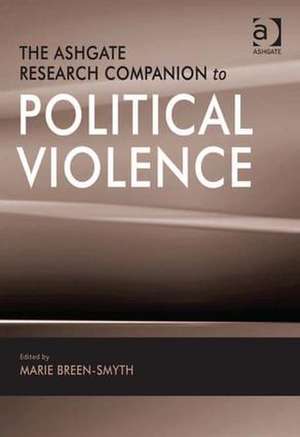The Ashgate Research Companion to Political Violence
Editat de Marie Breen-Smythen Limba Engleză Hardback – 18 dec 2012
Preț: 1254.92 lei
Preț vechi: 1753.66 lei
-28% Nou
Puncte Express: 1882
Preț estimativ în valută:
240.13€ • 261.66$ • 202.34£
240.13€ • 261.66$ • 202.34£
Comandă specială
Livrare economică 03-17 aprilie
Doresc să fiu notificat când acest titlu va fi disponibil:
Se trimite...
Preluare comenzi: 021 569.72.76
Specificații
ISBN-13: 9780754677529
ISBN-10: 0754677524
Pagini: 622
Dimensiuni: 169 x 244 x 44 mm
Greutate: 1.43 kg
Ediția:1
Editura: Taylor & Francis
Colecția Routledge
Locul publicării:Oxford, United Kingdom
ISBN-10: 0754677524
Pagini: 622
Dimensiuni: 169 x 244 x 44 mm
Greutate: 1.43 kg
Ediția:1
Editura: Taylor & Francis
Colecția Routledge
Locul publicării:Oxford, United Kingdom
Notă biografică
Professor Marie Breen-Smyth is Director of Research in the Department of Politics, University of Surrey, sits on the National Executive of the British International Studies Association and is a founding editor of the journal Critical Terrorism Studies. She is political advisor to the Campaign for All Injured, a cross sectoral group representing victims of political violence in Northern Ireland and founder of the Institute for Conflict Research.
Recenzii
’A balanced, tight-knit collection of essays from experts who write on the subject of political violence with an authority founded both on meticulous scholarship and, in many cases, direct experience. Under the editorial hand of Breen-Smyth, political violence is never reduced to a mere academic concept but is instead scrutinised and explained as a real force with devastating ramifications.’ Katy Hayward, Queen’s University Belfast, Northern Ireland ’If you want to choose one book to introduce you to different perspectives on political violence then this is the one. The editor has gathered scholars, practitioners and activists together to clarify the meaning of political violence. They consider its diverse genealogies and short, medium and long term impacts. These are then woven into a series of discussions about how to end different kinds of political violence and transform the relationships that brought them into existence. It is a must read book for anyone interested in how to conduct politics by peaceful rather than violent means.’ Kevin P. Clements, National Centre for Peace and Conflict Studies, University of Otago, New Zealand 'The Ashgate Research Companion to Political Violence is very readable and easy to understand, and is an excellent resource for undergraduate researchers and students. The book offers a good introduction to the topic of political violence with helpful and relevant additional resources for undergraduates and researchers as well as being easy enough to understand for the layperson... highly recommended...' Reference Review 'This edited collection offers an interesting and comprehensive introduction to the core issues, problems and debates in the study of political violence and its aftermath. An impressive mix of leading scholars and practitioners in the field tackle a wide range of questions from motivations, goals and forms of political violence to counter-terrorism in the UK, transitional justice and the relationship betw
Cuprins
Introduction; Part I Defining Political Violence; Chapter 1 Political Violence: An Overview, John Darby; Chapter 2 Orthodox Accounts of Terrorism, Jason Franks; Chapter 3 Critical Accounts of Terrorism, Richard Jackson; Chapter 4 State Violence as State Terrorism, Ruth Blakeley; Chapter 5 The ‘War on Terror’ as Political Violence, Richard Seymour; Chapter 6 The Concept of Security in Political Violence, Jessica Wolfendale; Part II Motivations and Goals of Political Violence; Chapter 7 From Dissent to Revolution: Politics and Violence, Harmonie Toros; Chapter 8 Why Do Individuals Resort to Political Violence? Approaches to the Psychology of Terrorism, Jeff Victoroff, Janice Adelman; Chapter 9 The Motivation of the Irish Rebel and Resistance to the Label ‘Terrorist’, Anthony McIntyre; Chapter 10 Martyrs without Borders: The Puzzle of Transnational Suicide Bombers, Mohammed M. Hafez; Chapter 11 The Origins and Inhibiting Influences in Genocide, Mass Killing and Other Collective Violence, Ervin Staub; Chapter 12 Religion as a Motivation for Political Violence, Jeroen Gunning; Part III Theorising, Understanding and Researching Political Violence; Chapter 13 Social Movement Studies and Political Violence, Donatella della Porta; Chapter 14 Feminist Reflections on Political Violence, Laura Sjoberg; Chapter 15 National Identity, Conflict and Political Violence: Experiences in Latin America, Peter Lambert; Chapter 16 Staying Alive while Conducting Primary Research: Fieldwork on Political Violence, Jeffrey A. Sluka; Part IV Manifestations of Political Violence; Chapter 17 Genocide as Political Violence, Adam Jones; Chapter 18 War as Political Violence, R. Gerald Hughes; Part V Countering Political Violence; Chapter 19 Intelligence and Political Violence: The Case of Counter-Terrorism, Frank Gregory; Chapter 20 Counter-Terrorism and its Effectiveness in the UK since 1969: Does It Pay to Be Tough on Terrorism?, Robert Lambert; Chapter 21 Counter-Terrorism and Human Rights since 9/11, Michael McClintock; Chapter 22 Counter-Terrorism and Human Rights in the UK, Clive Walker; Part VI Ending Political Violence; Chapter 23 The State’s Role in the Management and Resolution of Violent Conflict: Learning from Northern Ireland?, Bill Rolston; Chapter 24 Political Violence and Peace Processes, Roger Mac Ginty; Chapter 25 Civil Society Actors and the End of Violence, Avila Kilmurray; Part VII Dealing with the Aftermath; Chapter 26 Defining and Building the Rule of Law in the Aftermath of Political Violence: The Processes of Transitional Justice, Richard J. Goldstone, Adam M. Smith; Chapter 27 Political, Economic and Social Reconstruction after Political Violence: The Case of Afghanistan, William Maley; conclusion Conclusions;
Descriere
Aimed at scholars and students interested in peace and conflict studies, this companion is a comprehensive resource to the principal debates on political violence. With 27 specially commissioned essays written by leading scholars in the field, this authoritative guide and source book addresses a wide range of issues in a field which is becoming an increasingly important part of courses on peace and conflict.
